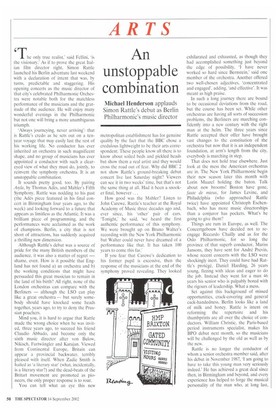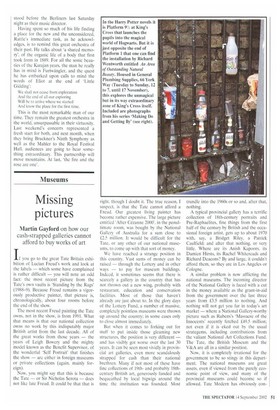An unstoppable combination
Michael Henderson applauds Simon Rattle's debut as Berlin Philharmonic's music director The only true realist,' said Fellini, 'is the visionary.' As if to prove the great Italian film director right, Simon Rattle launched his Berlin adventure last weekend with a declaration of intent that was, by turns, predictable and staggering. His opening concerts as the music director of that city's celebrated Philharmonic Orchestra were notable both for the matchless performance of the musicians and the gratitude of the audience. He will enjoy many wonderful evenings in the Philharmonic but not one will bring a more unambiguous triumph.
'Always journeying, never arriving': that is Rattle's credo as he sets out on a tenyear voyage that may easily last the rest of his working life, No conductor has ever inherited an orchestra in such magnificent shape, and no group of musicians has ever appointed a conductor with such a cleareyed view of what they must do, jointly, to reinvent the symphony orchestra. It is an unstoppable combination.
It sounds pretty good, too. By pairing Asyla, by Thomas Ades, and Mahler's Fifth Symphony. Rattle was nodding to his past (the Ades piece featured in his final concert in Birmingham four years ago, to the week) and looking forward to a future that appears as limitless as the Atlantic. It was a brilliant piece of programming, and the performances were acclaimed as the work of champions. Berlin, a city that is not short of attractions, has suddenly acquired a thrilling new dimension.
Although Rattle's debut was a source of pride for the many British members of the audience, it was also a matter of regret -shame, even. How is it possible that England has not found a) an orchestra and b) the working conditions that might have persuaded this great musician to remain in the land of his birth? All right, none of the London orchestras can compare with the Berliners — although the LSO can play like a great orchestra — but surely somebody should have knocked some heads together, years ago, to try to deny the Prussian poachers.
Mind you, it is hard to argue that Rattle made the wrong choice when he was invited, three years ago, to succeed his friend Claudio Abbado, and become only the sixth music director after von Bulow, Nikisch, Furtwangler and Karajan. Viewed from Continental Europe, Britain can appear a provincial backwater, terribly pleased with itself, When Zadie Smith is hailed as 'a literary star' (what, incidentally, is a literary star?) and the dead-beats of the Britart movement are promoted as pioneers, the only proper response is to roar.
You can tell what an eye this new metropolitan establishment has for genuine quality by the fact that the BBC chose a credulous lightweight to be their arts correspondent. These people know all there is to know about soiled beds and pickled heads but show them a real artist and they would cross the road out of fear. Why did BBC 2 not show Rattle's ground-breaking debut concert live last Saturday night? Viewers can see it in two weeks' time, but that's not the same thing at all. Had it been a snooker final, however ...
How good was the Mahler? Listen to John Carewe, Rattle's teacher at the Royal Academy of Music three decades ago and, ever since, his 'other' pair of ears. 'Tonight,' he said, 'we heard the first authentic performance of this symphony. We were brought up on Bruno Walter's recording with the New York Philharmonic but Waiter could never have dreamed of a performance like that. It has taken 100 years to come this far.'
If you fear that Carewe's dedication to his former pupil is excessive, then the response of the musicians at the end of the symphony proved revealing. They looked exhilarated and exhausted, as though they had accomplished something just beyond the edge of possibility. 'I have never worked so hard since Bernstein,' said one member of the orchestra. Another offered two well-chosen adjectives, 'concentrated and engaged', adding, 'and effective'. It was meant as high praise.
In such a long journey there are bound to be occasional deviations from the road, but the course has been set. While other orchestras are having all sorts of succession problems, the Berliners are marching confidently into a new century with the right man at the helm. The three years since Rattle accepted their offer have brought vast changes to the constitution of the orchestra but now that it is an independent foundation, at arm's length from the city, everybody is marching in step.
That does not hold true elsewhere. Just look at the mess the American orchestras are in. The New York Philharmonic begin their new season later this month with Lorin Maazel holding the baton. Talk about new brooms! Boston have gone, faute de mieux, for James Levine, and Philadelphia (who approached Rattle twice) have appointed Christoph Eschenbach, who has more music directorships than a conjuror has pockets. What's he going to give them?
Things are rum in Europe, as well. The Concertgebouw have decided not to reengage Riccardo Chailly and as for the Oslo Philharmonic, for so long the province of that superb conductor, Mariss Jansons, they have sent for Andre Previn, whose recent concerts with the LSO were shockingly inert. They could have had Rattle's protégé, Daniel Harding, 26 years young, fizzing with ideas and eager to do the job. Instead they went for a man 46 years his senior who is palpably bored with the rigours of leadership. What a mess.
Set against this background of missed opportunities, crack-covering and general cack-handedness, Berlin looks like a land of milk and honey. Rattle is intent on reforming the repertoire and his thumbprints are all over the choice of conductors. William Christie, the Paris-based period instruments specialist, makes his BP0 debut next month, so the musicians will be challenged by the old as well as by the new.
Rattle is no longer the conductor of whom a senior orchestra member said, after his debut in November 1987, '1 am going to have to take this young man very seriously indeed.' He has achieved a great deal since then, in Birmingham and beyond, and every experience has helped to forge the musical personality of the man who, at long last, stood before the Berliners last Saturday night as their music director.
Having spent so much of his life finding a place for the new and the unconsidered, Rattle's immediate task, as he acknowledges, is to remind this great orchestra of their past. He talks about 'a shared memory', of the organic life of a body that first took form in 1889. For all the sonic beauties of the Karajan years, the man he really has in mind is Furtwangler, and the quest he has embarked upon calls to mind the words of Eliot at the end of 'Little Gidding.: We shall not cease from exploration
And the end of all our exploring Will be to arrive where we started And know the place for the first time.
This is the most remarkable man of our time, They remain the greatest orchestra in the world, unsurpassable in their virtuosity. Last weekend's concerts represented a fresh start for both, and next month, when they bring Bruckner's Ninth Symphony as well as the Mahler to the Royal Festival Hall, audiences are going to hear something extraordinary. This partnership will move mountains. At last, 'the fire and the rose are one'.











































































 Previous page
Previous page